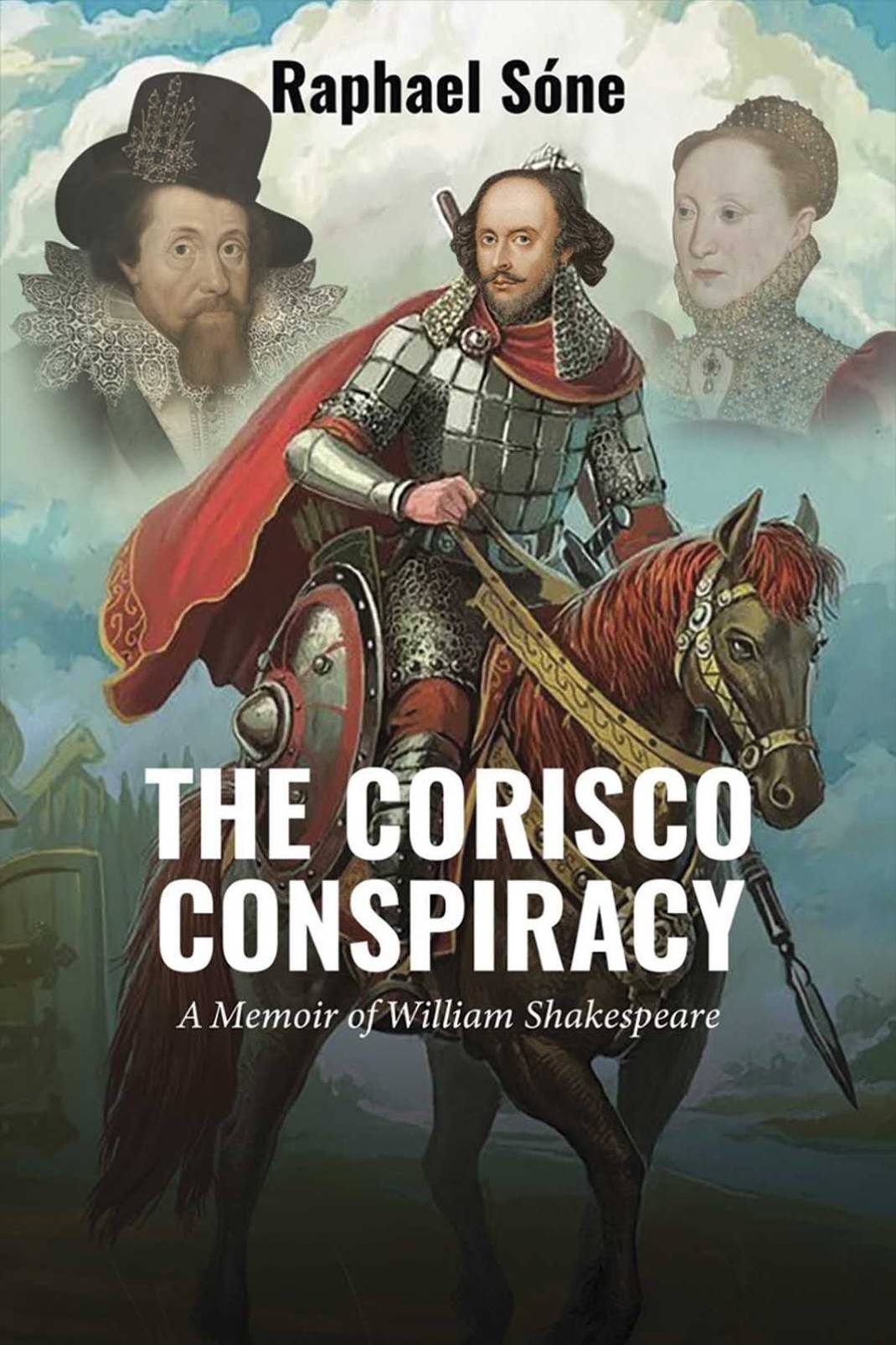The Corisco Conspiracy

Raphael Sóne's The Corisco Conspiracy is a historical novel based on the life of Shakespeare. Bold and inventive far beyond any other version of Shakespeare's life, it speculates that he was a Catholic secret agent who enlisted in the Armada invasion army and later took an active rôle in the Gunpowder Plot.
This Shakespeare travels widely from his teenage years onwards, not only to Italy, Spain and Portugal but as far as the island of Corisco off the coast of Equatorial Guinea, an idyllic place which might have inspired Prospero's Isle in The Tempest. He works alongside Guy Fawkes, Robert Catesby, Father John Gerard, S.J., Dr Roderigo Lopez and double agent Christopher Marlowe. He carries secret messages and visits Catholic prisoners in their cells in the Tower of London. He takes part in schemes to abduct and even assassinate Queen Elizabeth. He's hauled before the Privy Council on sedition charges and he also finds time to act in the theatre now and again.
In this novel, Elizabethan London is a very cosmopolitan place, and the Dark Lady is of mixed Portuguese and African descent. Shakespeare marries her and has a son. The book is a colourful fantasy full of plots, subterfuge and espionage.
Sóne, who writes a blog under the pseudonym of Musketman Shakespeare, clearly knows an immense amount about Elizabethan England, and is well up in Shakespearean scholarship (apart from the latest stuff on the dedication of the sonnets). He has woven a dense, complex and fairly consistent fiction around the facts we have, creating a Shakespeare who is vastly different from all other versions.
The result is an adventure story you can simply read for fun. The Corisco Conspiracy deserves to be made into a film. It's far more entertaining than the ridiculous, sentimental nonsense of Tom Stoppard's Shakespeare in Love or other overpraised recent fictions. The account of the events of November 1605 and the siege of Holbeche House where the Gunpowder Plot conspirators took refuge is genuinely exciting and vividly written. "Holbeche House had been reduced to a few smouldering pillars, which stood like oversize pieces on a demonic chessboard."
That the historical Shakespeare was a Catholic recusant and that his theatrical activities often provoked the authorities, there is little room to doubt. We know he came from a family of recusants. He wrote a poem The Phoenix and the Turtle, about Catholic martyrs. He took a notably Catholic stance in plays such as King John and Henry IV part 1. Falstaff was originally called Sir John Oldcastle, the name of a man the Protestants regarded as a martyr. The name was changed to Falstaff only after the Oldcastle family complained to a magistrate. It was reported after Shakespeare's death in 1616 that "he died a papist". A Catholic testament was found concealed in the rafters of his family home.
So if Guy Fawkes had arrived on Shakespeare's doorstep I don't suppose he would have been turned away or betrayed to the authorities. And maybe Will did crawl out of the smouldering embers of Holbeche House, the only one of the Gunpowder Plot conspirators to escape.
But he's a pretty strange sort of Catholic, who becomes a Muslim as well as a Catholic. Yep. Sóne's Will adopts his African wife's religion while never ceasing to cross himself and go to Mass. I don't find this very plausible even as fiction. It's just getting silly.
It's also a pity that the book chooses to perpetuate the idea that Shakespeare didn't write Shakespeare.
Sóne has bought into the theory, not a new one, that the real author of Shakespeare's plays was the cultivated, well-travelled Edward de Vere, Earl of Oxford, who had dangerous Catholic leanings. In this novel the earl is aided by Emmanuel Jenkins, a scholar from Cambridge, with a high-pitched voice and a flair for acting women's rôles on the stage. It turns out Jenkins has a secret advantage in this respect.
I think Shakespeare may have known Lord Oxford, been influenced by him and even borrowed books from him but why go further than that? Most people agree that the mature plays show a close knowledge of stagecraft and audience psychology. They are written by a professional man of the theatre.
If Oxford thought it was beneath him, as a nobleman, to write plays, why would his collaborator Jenkins have failed to take any credit? And how is this imaginary learned cross-dressing female dramatist supposed to have sent all the later plays to London from Equatorial Guinea, after escaping as a fugitive in 1605? Awkward. Especially as we know that all Shakespeare's later plays use sources published in England.
Would Heminge and Condell have dedicated the Folio to Will from Stratford in complete ignorance of the imposture? Would Ben Jonson have been taken in?
Shakespeare in Sóne's novel is not a classical scholar but is fluent in Italian and Spanish; he is a good enough poet to write Venus and Adonis, The Rape of Lucrece, and the Sonnets -- yet, we are told, he didn't write the plays, apart from The Merry Wives of Windsor, a not-very-good comedy in prose that he cobbles together using an old plot. This is odd. Rustic yokel Will was capable of writing some of the greatest Elizabethan poetry but not of writing one whole serious drama himself? Hmm. Even fiction should hold together better than that.
Of course such objections won't bother someone reading the book as a historical adventure story.
https://www.austinmacauley.com/us/book/corisco-conspiracy